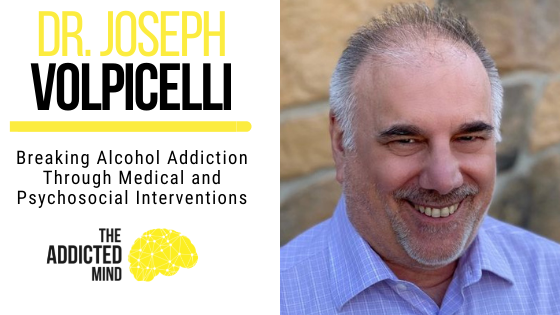On today’s episode of The Addicted Mind Podcast, Duane speaks with Dr. Joseph Volpicelli, a world-renowned scientist clinician whose research led to the discovery of naltrexone (a drug that treats alcohol addiction) among many other discoveries related to addiction treatment.
Today, he talks about how naltrexone can help someone struggling with alcohol addiction reduce their cravings. With the help of naltrexone as one of the tools in their toolkit of recovery, people can now start to build a meaningful, purposeful life. They also talk about the importance of the other component: not just the medical intervention, but also the psychosocial interventions for recovery.
Dr. Volpicelli has been interested in addiction treatment and research for 40 years now. Such interest started when he was a medical student working with individuals who were returning from Vietnam who had developed an alcohol addiction. Many of them were using opiates but when they came back to the United States, they started drinking more alcohol.
For a long time, he has been interested in the relationship between stress, alcohol drinking, and opiates, and has taken that observation into the laboratory working with rats. What he found out was that the ability to control trauma had a very profound effect in terms of one’s ability to fight something like cancer. When you’re exposed to uncontrollable trauma, your brain releases endogenous endorphins and endogenous morphine-like molecules that help kill the pain. The problem with addiction is that the behavior makes you feel better temporarily but it sows the seeds for the next episode when you’ll need to use alcohol or drugs again, thereby creating an addictive cycle.
Dr. Volpicelli discovered how naltrexone helps moderate the highs and lows and, therefore, helps break that addictive cycle. This then gives a person a chance to find other things in life and gives them a sense of purpose and social connectedness.
In this episode, you will hear:
- How Dr. Volpicelli got interested in addiction treatment
- Trauma and its effects on physical or behavioral disorders
- How stress is related to alcohol addiction
- Withdrawal from your own endogenous opiates
- The endorphin effect that happens in addiction
- How naltrexone breaks the addictive cycle
- Understanding the logical brain vs. the emotional brain
- The BRENDA Approach to enhance adherence
Key Quotes:
[04:06] – “The ability to control the trauma had a very profound effect in terms of one’s ability to fight something like cancer.”
[08:05] – “When you’re exposed to uncontrollable trauma, your brain releases endogenous endorphins and endogenous morphine-like molecules that help kill the pain.”
[09:24] – “A lot of times when people have a very stressful week, on the weekends, they just feel like sitting on a couch eating potato chips, and for some folks when they drink, it helps improve their mood… that’s probably withdrawal from your own endogenous opiates.”
[10:53] – “The problem with addiction is that the behavior, drinking alcohol or any other behavior, makes you feel better temporarily. But it sows the seeds for the next episode where you need to use the drug again. And so it creates an addictive cycle.”
[13:58] – “The naltrexone helps moderate the highs and lows so it helps break that addictive cycle.”
[15:33] – “By breaking that cycle, the medicine then gives a person a chance to find other things in life to give them a sense of purpose and social connectedness.”
[23:24] – “Rather than fight our emotional brain, it’s important to understand how it works.”
[25:55] – “We like to do something purposeful and meaningful in our lives. And people who establish that have much less risk of going back to relapse.”
Subscribe and Review
Have you subscribed to our podcast? We’d love for you to subscribe if you haven’t yet.
We’d love it even more if you could drop a review or 5-star rating over on Apple Podcasts. Simply select “Ratings and Reviews” and “Write a Review” then a quick line with your favorite part of the episode. It only takes a second and it helps spread the word about the podcast.
If you really enjoyed this episode, we’ve created a PDF that has all of the key information for you from the episode. Just fill in your information below to download it.

